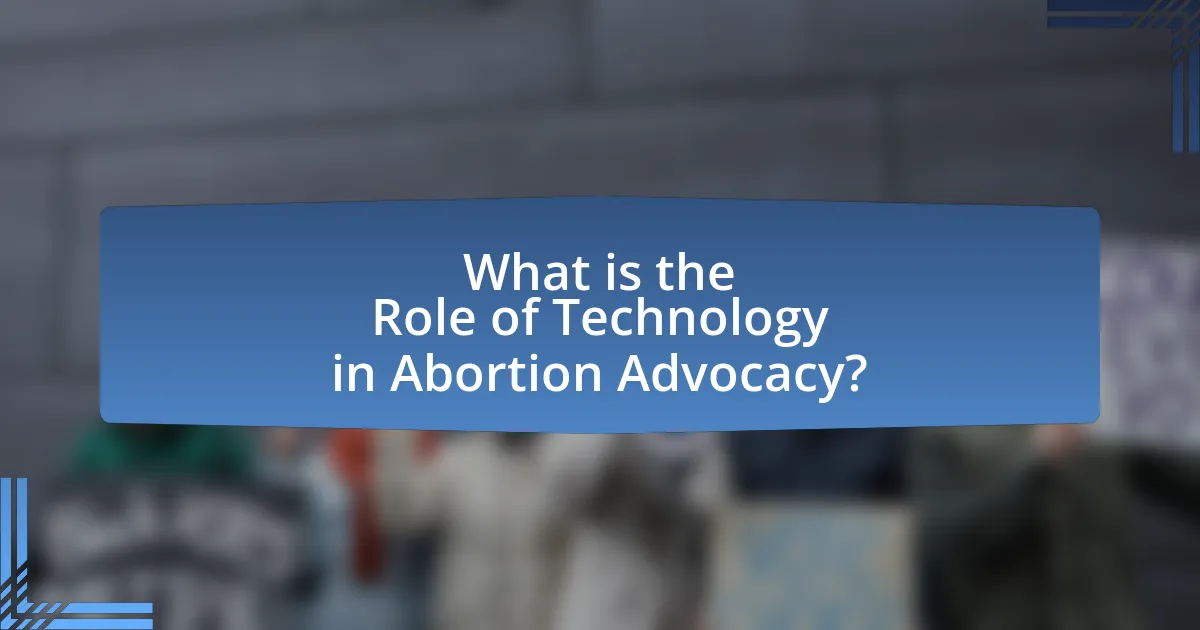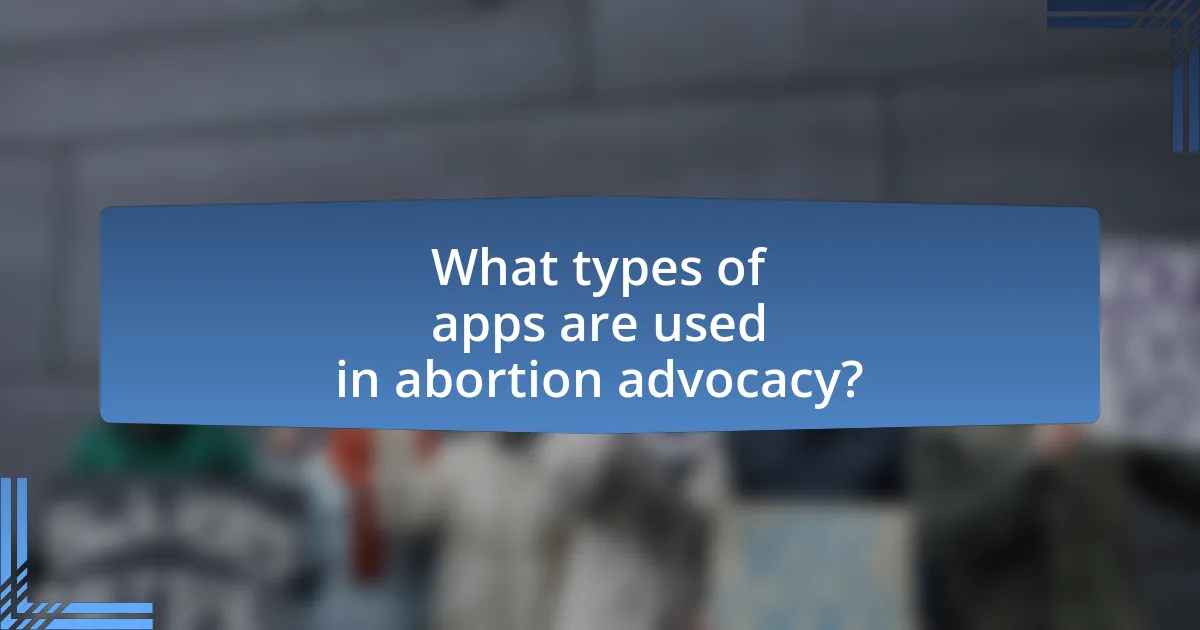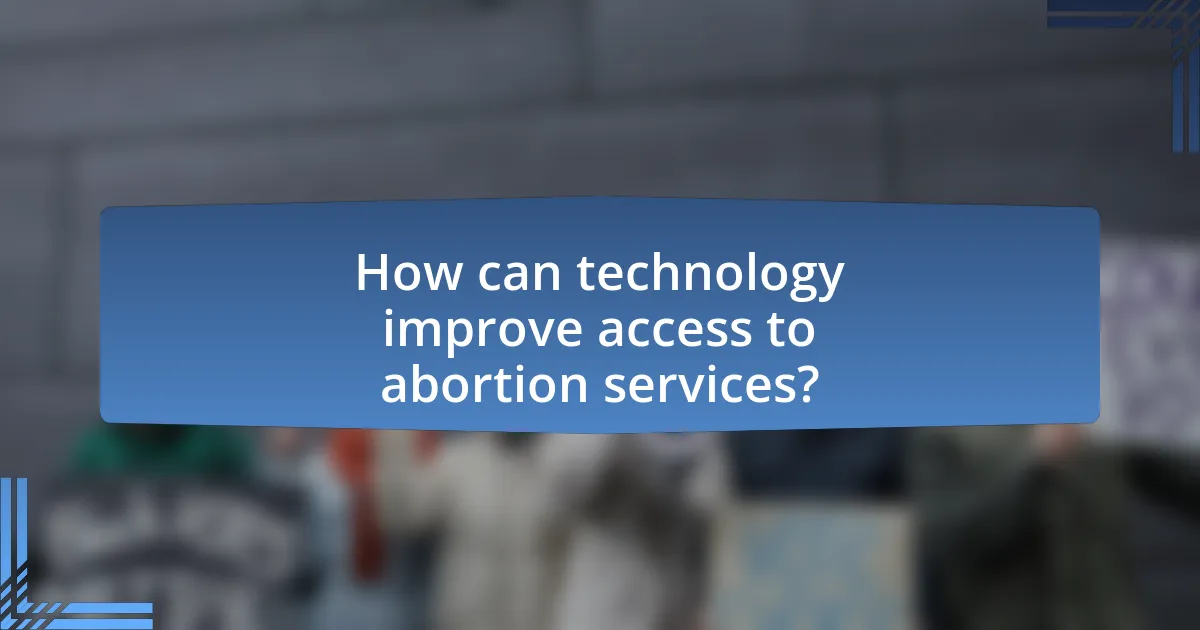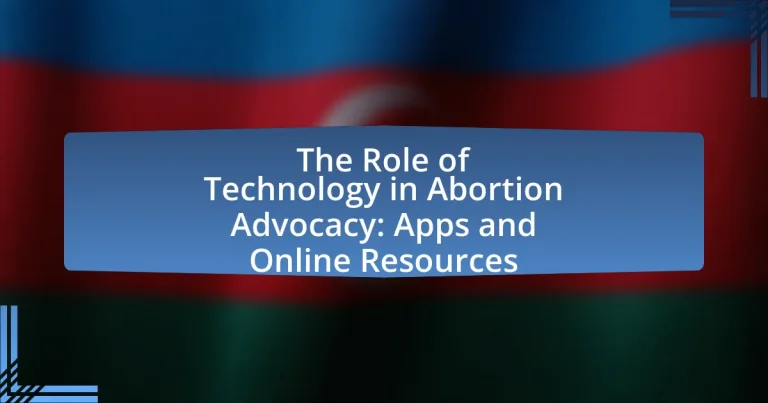The article examines the significant role of technology in abortion advocacy, highlighting how digital tools such as apps, websites, and telehealth services enhance access to information and support for individuals seeking reproductive health services. It discusses key technological advancements that facilitate communication, mobilization, and education, emphasizing the impact of online resources in empowering individuals to make informed decisions about abortion. Additionally, the article addresses the challenges faced by abortion advocacy without technology and outlines best practices for ensuring user privacy and data security in this sensitive area. Overall, it underscores the importance of technology in shaping public discourse and improving access to abortion care.

What is the Role of Technology in Abortion Advocacy?
Technology plays a crucial role in abortion advocacy by providing platforms for information dissemination, community support, and mobilization efforts. Digital tools such as websites, social media, and mobile applications enable advocates to share resources, educate the public, and connect individuals with reproductive health services. For instance, organizations like Planned Parenthood utilize online platforms to offer telehealth services, allowing individuals to access abortion care remotely, which is particularly vital in areas with limited access to clinics. Furthermore, data from the Guttmacher Institute indicates that 75% of women seeking abortions use the internet to gather information about their options, highlighting technology’s effectiveness in empowering individuals with knowledge and resources.
How has technology influenced abortion advocacy efforts?
Technology has significantly influenced abortion advocacy efforts by enhancing communication, mobilization, and access to information. Digital platforms, social media, and mobile applications have enabled advocates to disseminate information rapidly, organize campaigns, and connect individuals seeking reproductive health services. For instance, the use of apps like Plan C allows users to access information about medication abortion and find resources, while social media campaigns have raised awareness and fostered community support. According to a study published in the Journal of Medical Internet Research, online platforms have increased engagement and participation in advocacy efforts, demonstrating the effectiveness of technology in shaping public discourse and mobilizing support for abortion rights.
What are the key technological advancements in abortion advocacy?
Key technological advancements in abortion advocacy include the development of telemedicine services, mobile applications for reproductive health, and online platforms for information dissemination and support. Telemedicine has enabled remote consultations and medication prescriptions, increasing access to abortion services, particularly in areas with limited healthcare facilities. Mobile applications, such as those providing information on reproductive rights and local services, empower individuals to make informed choices. Online platforms facilitate community support and advocacy efforts, allowing for the sharing of resources and experiences. These advancements collectively enhance accessibility, education, and support in abortion advocacy, reflecting a significant shift in how reproductive health services are delivered and accessed.
How do these advancements impact access to abortion services?
Advancements in technology significantly enhance access to abortion services by providing individuals with information, resources, and support through apps and online platforms. These digital tools facilitate easier navigation of legal and medical information, allowing users to find nearby clinics, understand their rights, and access telehealth services for consultations and prescriptions. For instance, a study published in the American Journal of Public Health found that mobile health applications can increase awareness and utilization of reproductive health services, thereby improving access to abortion care.
Why is technology important for abortion advocacy?
Technology is important for abortion advocacy because it enhances access to information, resources, and support for individuals seeking reproductive health services. Digital platforms facilitate the dissemination of accurate information about abortion options, legal rights, and available services, which is crucial in areas where misinformation is prevalent. For instance, mobile apps and websites provide users with confidential resources, connecting them to healthcare providers and support networks. According to a study published in the American Journal of Public Health, access to online resources significantly increases the likelihood of individuals making informed decisions regarding their reproductive health. Thus, technology plays a vital role in empowering individuals and promoting informed choices in abortion advocacy.
What challenges does abortion advocacy face without technology?
Abortion advocacy faces significant challenges without technology, primarily in communication, information dissemination, and mobilization efforts. Without digital platforms, advocates struggle to reach a broader audience, limiting their ability to share critical information about reproductive rights and access to services. For instance, studies show that social media campaigns have increased awareness and support for abortion rights, highlighting the importance of technology in amplifying voices and messages. Additionally, the absence of online resources makes it difficult for individuals to access safe abortion information, which can lead to misinformation and increased stigma. Overall, the lack of technology hinders the effectiveness and reach of abortion advocacy initiatives.
How does technology enhance communication in abortion advocacy?
Technology enhances communication in abortion advocacy by providing platforms for information dissemination, community building, and mobilization efforts. Digital tools such as social media, websites, and mobile applications enable advocates to share resources, connect with supporters, and organize events efficiently. For instance, social media campaigns can reach millions quickly, raising awareness and fostering dialogue around abortion rights. Additionally, apps like “Planned Parenthood Direct” allow users to access healthcare information and services directly, streamlining communication between advocates and individuals seeking support. The effectiveness of these technologies is evidenced by the increased engagement and participation in advocacy efforts, as seen in the surge of online petitions and virtual rallies during significant legislative changes.

What types of apps are used in abortion advocacy?
Various types of apps are utilized in abortion advocacy, including informational apps, telehealth services, and community support platforms. Informational apps provide users with resources about reproductive health, legal rights, and access to services, such as the “Abortion Finder” app, which helps individuals locate nearby clinics. Telehealth services, like “Planned Parenthood Direct,” allow users to consult healthcare professionals remotely for advice and prescriptions. Community support platforms, such as “We Testify,” connect individuals with shared experiences to foster support and advocacy. These apps collectively enhance access to information and services, empowering users in their reproductive choices.
How do abortion-related apps support individuals seeking information?
Abortion-related apps support individuals seeking information by providing accessible, reliable, and personalized resources about abortion services, options, and reproductive health. These apps often include features such as symptom checkers, appointment scheduling, and educational content that empower users to make informed decisions. For instance, a study published in the Journal of Medical Internet Research found that mobile health applications can significantly improve users’ knowledge about reproductive health topics, including abortion, by offering evidence-based information and connecting users to local healthcare providers. This accessibility is crucial, especially in areas with limited healthcare resources, as it allows individuals to obtain necessary information discreetly and efficiently.
What features do these apps typically offer?
Abortion advocacy apps typically offer features such as information on local abortion services, appointment scheduling, and access to telehealth consultations. These apps often include educational resources about reproductive health, legal rights, and financial assistance options. Additionally, many provide community support through forums or chat functions, allowing users to connect with others for emotional support and shared experiences. The integration of GPS technology helps users locate nearby clinics, while privacy features ensure user data is protected, which is crucial given the sensitive nature of the topic.
How do user experiences vary across different abortion apps?
User experiences across different abortion apps vary significantly based on features, usability, and the type of information provided. For instance, some apps prioritize user privacy and offer anonymous support, while others focus on providing comprehensive medical information and resources. A study by the Guttmacher Institute found that apps with user-friendly interfaces and clear navigation tend to receive higher satisfaction ratings from users, indicating that ease of use is a critical factor in user experience. Additionally, apps that include community support features or direct access to healthcare professionals often enhance user engagement and satisfaction, as reported in user feedback surveys.
What role do online resources play in abortion advocacy?
Online resources play a crucial role in abortion advocacy by providing accessible information, support, and community engagement for individuals seeking reproductive health services. These resources include websites, social media platforms, and mobile applications that offer educational content about abortion options, legal rights, and health services. For instance, organizations like Planned Parenthood and the Guttmacher Institute utilize their online platforms to disseminate accurate data and resources, which empower individuals to make informed decisions. Additionally, online forums and social media groups foster community support, allowing users to share experiences and advice, thereby enhancing the overall advocacy efforts for reproductive rights.
What types of online resources are most commonly used?
The most commonly used online resources in abortion advocacy include informational websites, mobile applications, social media platforms, and online forums. Informational websites provide essential data on reproductive health, legal rights, and access to services, while mobile applications offer tools for tracking menstrual cycles, finding clinics, and connecting with healthcare providers. Social media platforms serve as channels for advocacy campaigns, community support, and sharing personal stories, and online forums facilitate discussions and peer support among individuals seeking information or assistance. These resources are vital for raising awareness and providing accessible information to those in need.
How do these resources help in educating the public about abortion?
Resources such as apps and online platforms educate the public about abortion by providing accessible, accurate information and facilitating discussions. These digital tools offer evidence-based content, including medical facts, legal rights, and personal stories, which help demystify the topic and counter misinformation. For instance, studies show that users of abortion-related apps report increased knowledge about their options and rights, leading to more informed decision-making. Additionally, online forums and social media campaigns create supportive communities where individuals can share experiences and seek guidance, further enhancing public understanding of abortion.

How can technology improve access to abortion services?
Technology can improve access to abortion services by providing telehealth options, which allow individuals to consult healthcare providers remotely. This method increases accessibility, particularly for those in rural or underserved areas, as it eliminates the need for travel and reduces waiting times. A study published in the American Journal of Public Health found that telehealth services can significantly increase the number of patients seeking abortion care, demonstrating a 20% increase in access when such services are available. Additionally, mobile apps and online resources can offer information on local providers, legal rights, and financial assistance, further empowering individuals to make informed decisions about their reproductive health.
What are the barriers to accessing abortion services that technology can address?
Technology can address several barriers to accessing abortion services, including geographical limitations, lack of information, and stigma. Geographical limitations often prevent individuals in rural or underserved areas from reaching clinics; telemedicine and mobile health apps can provide remote consultations and medication delivery, thus expanding access. Lack of information about available services and legal rights can be mitigated through online resources and educational platforms that offer accurate, up-to-date information. Additionally, stigma surrounding abortion can be reduced through anonymous online support groups and forums, allowing individuals to seek help without fear of judgment. These technological solutions enhance accessibility and empower individuals to make informed decisions regarding their reproductive health.
How do telehealth services facilitate access to abortion care?
Telehealth services facilitate access to abortion care by providing remote consultations and prescriptions, which eliminate the need for in-person visits. This approach allows individuals to receive medical advice and necessary medications from licensed healthcare providers without geographical barriers. A study published in the American Journal of Public Health found that telehealth can significantly increase access to abortion services, particularly in rural areas where clinics may be scarce. By utilizing telehealth, patients can maintain privacy and reduce travel costs, making abortion care more accessible and convenient.
What role do online consultations play in the abortion process?
Online consultations play a crucial role in the abortion process by providing accessible medical advice and support to individuals seeking abortion services. These consultations enable patients to discuss their options, receive guidance on the procedure, and understand the legal and medical aspects involved, all from the comfort of their homes. Research indicates that telehealth services, including online consultations, have increased access to reproductive health care, particularly in areas with limited clinic availability. For instance, a study published in the American Journal of Public Health found that telehealth can reduce barriers to care, such as transportation and stigma, thereby facilitating timely access to abortion services.
How can technology ensure privacy and security for users?
Technology can ensure privacy and security for users through encryption, secure data storage, and anonymization techniques. Encryption protects user data by converting it into a coded format that can only be accessed by authorized parties, making it difficult for unauthorized users to intercept or read sensitive information. For instance, end-to-end encryption used in messaging apps ensures that only the sender and recipient can access the messages, safeguarding personal conversations.
Secure data storage practices, such as using cloud services with strong security protocols, help protect user information from breaches. According to a 2021 report by IBM, organizations that implemented strong security measures reduced the average cost of a data breach by 30%. Anonymization techniques further enhance privacy by removing personally identifiable information from datasets, allowing for data analysis without compromising individual identities.
These technological measures collectively create a safer environment for users, particularly in sensitive areas like abortion advocacy, where privacy is paramount.
What measures are in place to protect user data in abortion apps?
Abortion apps implement several measures to protect user data, including end-to-end encryption, anonymization of user information, and strict data access controls. End-to-end encryption ensures that data transmitted between the user and the app remains confidential and inaccessible to unauthorized parties. Anonymization techniques are employed to remove personally identifiable information, allowing users to access services without revealing their identities. Additionally, strict data access controls limit who can view or handle user data, often requiring user consent for data sharing. These measures are critical in safeguarding sensitive information, especially in a context where privacy is paramount.
How do users perceive the security of their information when using these technologies?
Users generally perceive the security of their information as a significant concern when using technologies related to abortion advocacy, particularly apps and online resources. This perception is influenced by the sensitive nature of the information shared, as users fear potential data breaches or misuse by third parties. A survey conducted by the Pew Research Center in 2021 found that 70% of users expressed concerns about their personal data being accessed without their consent, highlighting the importance of robust security measures in these technologies. Additionally, the implementation of end-to-end encryption and transparent privacy policies can enhance user trust, as evidenced by studies showing that users are more likely to engage with platforms that prioritize data protection.
What best practices should be followed when using technology for abortion advocacy?
Best practices for using technology in abortion advocacy include ensuring data privacy, utilizing secure communication channels, and providing accurate information. Data privacy is crucial as advocates must protect sensitive information about individuals seeking abortion services; for instance, using encrypted messaging apps can safeguard personal conversations. Secure communication channels, such as dedicated hotlines or secure websites, help maintain confidentiality and trust. Providing accurate information is essential to counter misinformation; studies show that access to reliable resources increases informed decision-making among individuals considering abortion. By adhering to these practices, advocates can effectively support individuals while maintaining ethical standards and safety.


